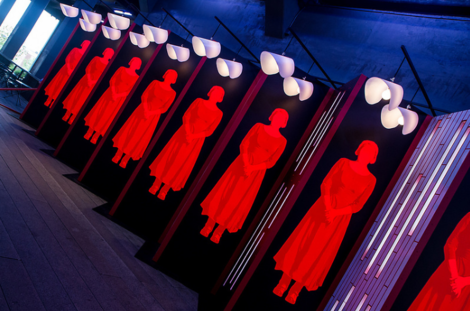Your podcast discovery platform
Curious minds select the most fascinating podcasts from around the world. Discover hand-piqd audio recommendations on your favorite topics.

piqer for: Global finds Technology and society Globalization and politics
Elvia Wilk is a writer and editor living in New York and Berlin, covering art, architecture, urbanism, and technology. She contributes to publications like Frieze, Artforum, e-flux, die Zeit, the Architectural Review, and Metropolis. She's currently a contributing editor at e-flux Journal and Rhizome.
Today's 'Handmaidens' Are Servants Of Neoliberalism, Not Traditionalism
My favorite feminist science fiction reference to appear on a protest slogan this year is: “Make Margaret Atwood Fiction Again!”
This phrase refers to a) the recent Hulu adaptation of Margaret Atwood’s 1985 science fiction novel, The Handmaid’s Tale and b) the current attack on women’s reproductive rights on the part of the the US government.
There have been many debates surrounding the new TV show—including how it deals with intersectional feminism, and how it updates a retrofuturist vision to account for recent societal evolutions like social media—but this article made a point that gave me pause:
The Handmaid’s Tale is less a dystopian nightmare about Trump’s America than a comforting fiction that progressives tell ourselves, that we’re still fighting the simple battles of the past.
The original book is set in a society with declining birthrates, where contraception has been made illegal and women who are able to bear children have been enslaved for the purpose. This essay argues that the show’s rendition of the plot offers an outdated idea of what the fight for (women’s) rights should look like today. She says:
The real-world dystopia for the majority of women in the age of Trump is not that they are being forced to have children by a repressive traditionalist state but that they’re being compelled not to by far more insidious forces... The real material unfreedom women experience today is a product of the subordination of everything to the market, not to traditionalism.
I don’t think traditionalism and neoliberalism are mutually exclusive (we are seeing how they support each other), but they are not the same thing. I was glad for the reminder.

I feel this article is still somewhat reactionary in content, given that a) the world is vastly overpopulated, and b) that it is suggesting that having children is something which is innately womanly and thus some sort of 'right'.
The fact of the matter is if our population is to continue growing at current rates we would face an even greater environmental catastrophe - indeed the decline in birth rates in the West and East Asia is one of the greatest achievements of these societies.